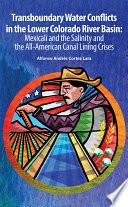Autores del Libro:
Resumen del Libro:

This book presents the views of irrigation water users and managers who experienced two critical and emblematic transboundary water conflicts in the lower Colorado River that affected the people’s daily lives, particularly in the Mexicali Valley region. While analyzing both the Colorado River Salinity Problem in the 1960s and the All-American Canal Lining divergence in the 2000s, the institutional analysis approach employed in this book has a comprehensive scope that describes in detail the features of the conflicts, as well as the changes in people’s ways of participating in facing such crises. Also, such an institutional learning process allows identifying possible binational cooperative alternatives to jointly face not only suitable ways out of critical conflicts for both countries, but also to face the tremendous threats of climate change in the Colorado River Basin, in which all people living and working there hold key roles as users of the same principal water source of the region. Best transboundary water management strategies for the Colorado River can be reached when a diverse and broad base of key actors in the two countries are directly involved in the processes of effective participation. This in turn might improve the ability to deal with the everlasting water conflicts. As a result, major perils of extreme water events, such as drought or flooding, can be effectively addressed on bearing in mind the overall goal of developing, managing, and using this precious water source in an equitable, sustainable, and efficient fashion.
Formatos Disponibles: PDF / EPUB
Opciones de descarga:
Si deseas obtener una copia del libro puedes usar alguna de las siguientes opciones de descarga:
